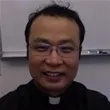Relevance of Religion Politics and Purpose

Rev. Jaehwa J. Lee
Bryn Mawr College- 104 Aelwyd on Cambrian Row
Fatherjaehwa@me.com
Haverford College - 208 Whitehead Campus Center
Fatherjaehwa@me.com
Swarthmore College - Bond Hall - 20
jlee3@swarthmore.edu
The Break provided space for percolating thoughts to come to a simmer, if not a boil. Thoughts that were moving on parallel tracks, but so apace of each other that they might wave at each other and enjoy to journey to a common destiny...this little offering. They have to do with the inescapable import of the mid-term elections up next week and the role of a liberal arts education in the creation of the perfect citizen.
One topic was launched at SWAT's pre-break Theology and Pizza that worked on the origins and the current place of gospel principles in the crafting of the political realm and the place of Christians in society. The Vatican Council II distilled centuries old political theory in one section of its Declaration on the Church in the Modern World (Gaudium et Spes, ¶ 73-76)
The Council sees political associations founded on the recognition that individuals and families and societal groups cannot achieve truly human life all by themselves. Political associations strive to combine shared contributions of their members toward the achievement of the good of the whole. That is the purpose of politics....the common good. Since that common good is, in turn, founded on human nature, such endeavors achieve their purpose, or not, depending upon how coordinated they are to human nature, to what God has created in us humans. Good politics knows humanity as nature reveals it. Bad politics attempts to impose definitions and theory on humanity that violate human nature. It's why democracy works better than tyranny.
In an insightful, and rather brief, reflection in the current Wilson Quarterly, Michael Lind, Whitehead Senior Fellow at the New America Foundation, argues that traditional liberal arts education needs to return to its foundation in the theories of Isocrates and Cicero that education in the liberal arts was, first and foremost, a training for excellence in citizenship. Knowledge of the liberal arts is to enable those who work with their minds, rather than their hands in the crafts of life, so that the society might be molded by 'free men' (liberati) toward the best perception of what human society ought to be. Lind calls, not for the forsaking of the trend in liberal arts education toward pre-professional training on the undergraduate level -- pre-med, pre-law, etc -- but the sense that the liberal arts dimension of education might better take place on the high-school level, as with the German gymnasium or the American prep-school.
I wonder if those early teen minds are up to the task...not in terms of intellectual capacity, but in more necessary dimension of maturity and a sense of the purpose of life, and so, of education, beyond establishing a high standard of living.
That is where our patron, John Henry Newman, has been so influential. In his seminal treatise on The Idea of a University, which has become a pillar in the structure of Western higher education, Newman's insights on the essence of liberal education, a perspective to which Gaudium et Spes owes no little debt.:
When the Church founds a University, she is not cherishing talent, genius, or knowledge, for their own sake, but for the sake of her children, with a view to their spiritual welfare and their religious influence and usefulness, with the object of training them to fill their respective posts in life better, and of making them more intelligent, capable , active members of society....Certainly a liberal education does manifest itself in a courtesy, propriety, and polish of word and action, which is beautiful in itself, and acceptable to others; but it does much more. It brings the mind into form....
Learn well the definition of Man....mind, body, soul. Work untiringly for a society that allows that definition to take flesh. And understand well that, in a democracy, it is a sin not to vote.



